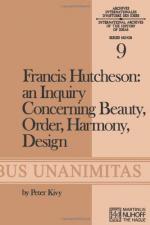|
This section contains 4,860 words (approx. 17 pages at 300 words per page) |

|
Dictionary of Literary Biography on Francis Hutcheson
Francis Hutcheson, moral philosopher, led the attempts of the Scottish Enlightenment to ground moral discourse on the presuppositions of current psychological and epistemological theories--primarily those of John Locke--and to construct an ethical system oriented toward an essentially social, rather than private, view of the ends of moral life. Hutcheson drew together the ideas of Locke, the third Earl of Shaftesbury (1671-1713), Joseph Butler (1692-1752), and the ancient moralists (particularly Cicero and Aristotle) to become the spokesman for the moral-sense philosophy. His theory of aesthetics contributed to neoclassicism, and his ideas of ethics and economics influenced not only his fellow Scots David Hume and Adam Smith but also early British utilitarianism. Hutcheson's writings found attentive audiences in America, in such divergent quarters as the theological ethics of Jonathan Edwards, the liberal religion of William Ellery Channing, and the political ideas of Thomas Jefferson.
Hutcheson was born into a family...
|
This section contains 4,860 words (approx. 17 pages at 300 words per page) |

|


